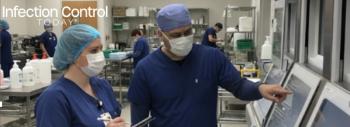
A Seat at the Table: CS/SP Professionals Vital to Infection Prevention, Positive Patient Outcomes
By Anthony Thurmond, CRCST, CIS, CHL
For many years, central service/sterile processing (CS/SP) was the behind-the-scenes department that wasn’t always recognized for its critical contributions to patient care and patient safety.
Throughout the world, CS/SP professionals are assuming many roles within their facilities, taking on a range of vital and often challenging tasks and responsibilities that allow frontline healthcare professionals to safely, effectively and efficiently meet the needs of the patients they directly serve. Most often, CS/SP professionals’ roles, responsibilities and contributions are performed outside the purview of the patient and their families.
Indeed, most patients have never met the CS/SP technician who was responsible for the proper cleaning, preparation and sterilization of the instruments or equipment used during their procedure. They likely were unaware that the processes and policies developed to allow all these tasks to happen were established and implemented for patient safety and successful outcomes. As patients complete their report card or survey upon completion of their stay, they will likely never know to mention the CS/SP professional who worked diligently and served as a vital cog in the wheel of their successful outcome.
To be clear, this is not a complaint of how a healthcare department and its staff are deprived of recognition. In contrast, it is the acknowledgement that CS/SP technicians have always known that without their efforts and strict adherence to standards and best practices, safe, high-quality patient care simply cannot be achieved.
This is why the CS/SP department is often called “The Heart of the Hospital.” Those of us who work in the profession have always known this to be true and, thankfully, over the years, others have begun recognizing the vital role we play in patient care and positive outcomes.
For all my career, which began in the U.S. Air Force, I have always known that one of our strongest allies in our facility is the infection preventionist (IP). We have come to know them as our guides â our fellow germ warriors â and they always know there is a patient on the receiving end of our products and services. IPs have helped underscore the essential point that everything we do is vital to the patient and that there is no room for error. More than ever, our IP allies understand and respect our roles, seek our professional experience and expertise, and acknowledge all the ways we help serve other departments.
The world of CS/SP has evolved over the years from linen wrapping of instrument trays to more standardized wrappers and containers to maintain sterility. We have expanded from steam and ethylene oxide (EtO) sterilization to also include low-temperature sterilization and high-level disinfection options. We have seen surgical procedures shift from “open surgeries” to minimally-invasive (yet still complex) ones performed laparoscopically and even robotically. Through all these changes, we have broadened our professional knowledge and skill sets, and stood firmly in our commitment and focus of doing what is right for every patient, every time.
One of the unique tools CS/SP professionals have available today is the ability to track and monitor sterilization through computerized instrument tracking systems. These systems allow them to provide documentation for previous sterilization loads in seconds to prove the correct cycles and requirements were met â and they can even allow CS/SP professionals to track the use of the precise instruments to a specific patient.
Thanks to these systems, the department no longer must track sterilization records in boxes stored for multiple years. They can also gain instant access to manufacturers’ instructions for use (IFU) to ensure technicians are properly cleaning, prepping and sterilizing/high-level disinfecting each item processed.
The ability to grow with new technology within the CS/SP field has enabled the technician to evolve with the changing world of healthcare. An emphasis on certification and competencies lie at the heart of that growth.
Today’s CS/SP professionals can hold multiple certifications, each of which helps increase valuable knowledge and skill sets. Maintaining these certifications also requires professionals to maintain their continuing education, which helps ensure they can continue performing their responsibilities safely, consistently and effectively â and in accordance with the latest standards and requirements. Many facilities now require certification as a condition of technician employment and some states require technician certification at the legislative level. Beyond that, some CS/SP professionals serve on committees as subject matter experts in the development of new standards. Put simply, today’s CS/SP professionals face more complex challenges in light of innovative and ever-evolving procedures, instrumentation, equipment and technologies. They are building upon their knowledge and rising to meet the evolving demands and needs of their healthcare customers.
Stopping the spread of infection or cross-contamination is a team effort. Collaboration among departments within healthcare facilities provides valuable opportunities for process improvement and better patient outcomes. Not surprisingly, CS/SP has become a major stakeholder in this collaboration.
CS/SP professionals are the instrumentation and reprocessing experts, and they also have a keen understanding of the standards, policies and practices to help ensure the delivery of quality service and patient care. Often, manufacturers consult with CS/SP professionals to help them better understand (and address) instrument design and the ability to properly clean and sterilize a device. Increasingly, manufacturers recognize that if an instrument cannot be properly cleaned, it cannot be sterilized.
Healthcare continues to look for opportunities to prevent infections and cross-contamination and ensure patient safety. CS/SP professionals have always been there, providing outstanding results from behind the scenes. Fortunately, they are now being viewed as a vital team player who deserves a seat at the table where interdepartmental collaboration and teamwork can take place in the name of quality patient care and patient safety.
Anthony Thurmond, CRCST, CIS, CHL, is IAHCSMM’s president-elect and serves as central service manager at The Christ Hospital Health Network.
Newsletter
Stay prepared and protected with Infection Control Today's newsletter, delivering essential updates, best practices, and expert insights for infection preventionists.




